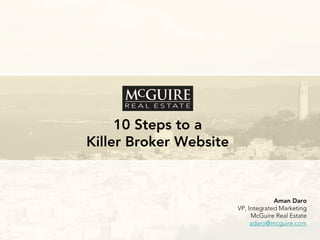Inman Real Estate Connect SF 2009 - How to Build a Killer Website From Scratch
- 1. 10 Steps to a Killer Broker Website Aman Daro VP, Integrated Marketing McGuire Real Estate adaro@mcguire.com
- 2. McGuire Real Estate > 90 year old residential brokerage > Boutique, luxury brand covering the San Francisco Bay Area > 250 agents, 8 offices Photo: Mapjack
- 3. mcguire.com > One of the first real estate websites in SF
- 4. 1. Choose Vendors Wisely > Front-end and back-end not necessarily the same company – 1000Watt + Elevated Rails > Understanding usability and company objectives can trump project estimate > Hope you like working with them
- 5. 2. Technology Shouldn’t Get in the Way > Pick technologies for – Ease of development and maintenance – What will be favorable in the future > Ruby on Rails allows for very quick development > Too much Flash can be bad > Open source back end is preferred by many, but keep security in mind Photo: abigol
- 6. 3. Define Your Target Audiences > > > > Potential clients Current sellers Agents Management – Understand difference between management’s needs and user’s Photo: Morten Elbech Sørensen
- 7. 4. Information Architecture is Underrated > Rarely used by small/medium businesses, but critical in information-rich websites Simple structure = better experience = more users = more business
- 8. 5. Listings Are The Center of the Universe > The primary reason users visit a broker site > Design around this objective – Easy to access across site, large photos, etc. > Develop content to support this goal – Neighborhood info, stats, user-generated content, etc.
- 9. 6. SEO From the Ground Up > Site structure should be search-engine friendly > Unique title/headline/tight cluster of keyword phrase(s) for every page > Pick relevant keywords with Google Keyword Search Tool > Don’t forget long tail
- 10. 7. Design: Less is More > White space lets the message “breathe” > Home page – Focus on few key messages – Allocate % of home page real estate to priority of message
- 11. 8. Optimize for Conversion > A “cool” web 2.0 site isn’t enough. Demand ROI. > Clear call to action – White space – Buttons near images > Test – Google Website Optimizer
- 12. 9. Plan for The Future > Needs will change and expand > Site should accommodate those changes Photo: pigeon pair
- 13. 10. Evergreen Endeavor > Project doesn’t end after launch – Maintenance – Adaptation to changing market demands – Consider redesign in 5-7 years – Need budget and team on call Photo: Sam Howzit
- 14. www.mcguire.com Send your feedback to: adaro@mcguire.com














